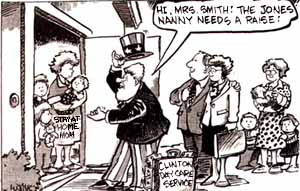|
|
Mona Charen
Better than nothing?
All the King's horses
In 1988, Congress and the president decided to invest in a large-scale human services
program. The idea was to see whether intensive and comprehensive social services for "at
risk" families -- that is, families who are poor, uneducated and have single parents -- could
improve outcomes for these children. The results are now in.
But first, the rationale: The theory was that while there are scores of programs aimed at
poor children -- Head Start, the Infant Health and Development Program, the Even Start
Family Literacy Program, the Advance Family Support and Education Program, Child
Survival/Fair Start, and New Chance to name just a few -- poor single mothers may have
difficulty accessing the services for which they are eligible.
The Comprehensive
The program was carefully designed, implemented and monitored at 24 different sites
around the country, some rural, some urban. As described by the Department of Health and
Human Services, the purpose of the program was to "intervene as early as possible in
children's lives, involve the entire family, ensure the delivery of comprehensive social
services to address the intellectual, social-emotional and physical needs of infants and
young children in the household, ensure the delivery of services to enhance parents' ability
to contribute to the overall development of their children and achieve economic and social
self-sufficiency, and ensure continuous services until children enter elementary school at
the kindergarten or first grade level."
It was, in short, a social worker's dream of a federal program. Each single mom got her own
personal case worker who would direct her to parenting classes, remedial education, food
stamps, child care, therapy, "life skills training" and whatever else the federal and local
governments were providing.
The government officials who designed and implemented the program were careful and
conscientious. Each month, there were conference calls among the various program
directors to monitor their progress. Three-day meetings for program grantees were held in
Washington, D.C., every four months.
But the CCDP also so did something else -- something that is often lacking from
well-intentioned interventions of this kind. As Congress required, the project also
maintained records on a control group -- that is, a group of mothers who were comparable
in every way to those in the program but who were receiving none of the services.
After five years, the results are in, and while the Department of Health and Human Services
didn't announce them with the ruffles and flourishes that would have accompanied a
success story, they did at least tell the truth. The program failed. All of the best efforts of
the finest social workers the government could find made absolutely no difference in the
lives of these poor, uneducated, unmarried mothers.
Were there improvements in the income levels, reductions in welfare dependence and
increases in vocabulary among the children? Yes. But exactly the same improvements
were found among the control group. The cost, per family, of the enhanced social service
delivery of CCDP was $15,768 per year. (Head Start costs an average of $4,500 per year.)
The Department of Health and Human Services acknowledges that the failure of CCDP
cannot be blamed on poor program design, faulty implementation or lack of funding.
But it does flinch from the larger implications. The reason programs like this are
unsuccessful is that there is no substitute for an intact family. By every measure of
well-being, children raised by two married parents (biological or adoptive) do better than
those raised in single-parent, step-parent or other families. This is without reference to
income.
Someday, policy makers will awaken to the fact that the most compassionate thing we can
do for poor, single moms and their offspring is to persuade young girls not to become
single moms in the first

And all the King's men
Couldn't put Humpty together again.
 Child Development Program was designed to ensure that each parent
would be assigned her own case worker, who would introduce her to available services,
monitor her and her child's progress, and steer her toward other services as needed.
Child Development Program was designed to ensure that each parent
would be assigned her own case worker, who would introduce her to available services,
monitor her and her child's progress, and steer her toward other services as needed.
3/6/98: Of fingernails and freedom
3/3/98: Read JWR! :0)
2/27/98: Dumb and Dumber
2/24/98: Reagan reduced poverty more than Clinton
2/20/98: Rally Round the United Nations?
2/17/98: In Denial
2/13/98: Reconsidering Theism
2/10/98: Waiting for the facts?
2/8/98: Cat got the GOP's tongue?
2/2/98: Does America care about immorality?
1/30/98: How to judge Clinton's denials
1/27/98: What If It's Just the Sex?
1/23/98: Bill Clinton, Acting Guilty
1/20/98: Arafat and the Holocaust Museum
1/16/98: Child Care or Feminist Agenda?
1/13/98: What We Really Think of Abortion
1/9/98: The Dead Era of Budget Deficits Rises Again?
1/6/98: "Understandable" Murder and Child Custody
1/2/98: Majoring in Sex
12/30/97: The Spirit of Kwanzaa
12/26/97: Food fights (Games children play)
12/23/97: Does Clinton's race panel listen to facts?
12/19/97: Welcome to the Judgeocracy, where the law school elite overrules majority rule
12/16/97: Do America's Jews support Netanyahu?